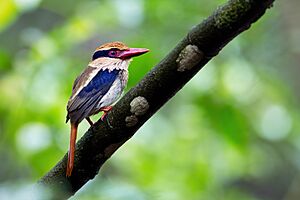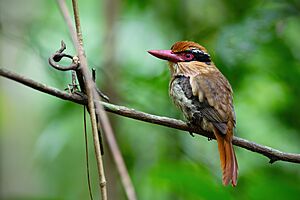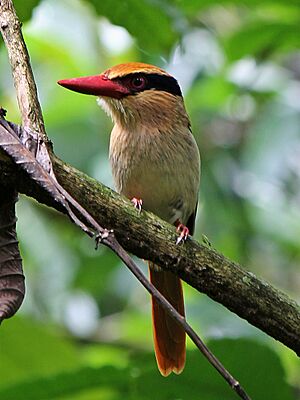Sulawesi lilac kingfisher facts for kids
Quick facts for kids Sulawesi lilac kingfisher |
|
|---|---|
 |
|
| male | |
 |
|
| female | |
| Conservation status | |
| Scientific classification |
The Sulawesi lilac kingfisher (Cittura cyanotis) is a beautiful bird found only on the Indonesian island of Sulawesi and a smaller island called Lembeh. It's a special type of kingfisher, known for its bright colors and unique look. These birds live in the low-lying forests of these islands.
Contents
What's in a Name?
The name cyanotis comes from old Greek words. Kuanos means "dark blue," and -ōtis means "eared." So, its name basically means "blue-eared," which makes sense when you see its blue eye mask!
A Dutch scientist named Coenraad Jacob Temminck first officially described this bird in 1824. He gave it its scientific name, which helps scientists around the world know exactly which animal they are talking about.
What Does It Look Like?
The Sulawesi lilac kingfisher has the typical shape of a kingfisher: a short tail and a long, strong beak.
Male Kingfisher's Colors
The male bird is quite colorful!
- Its head and back are brown.
- Its rump (the area above its tail) and tail feathers are a reddish-brown color.
- It has a bright blue mask around its eyes, which is separated from its brown head by a thin white line.
- Around its ears, it has soft, pale lilac feathers that look like a fancy ruff.
- Its belly and chest are white.
- Its wings are blue, with a white line separating them from its brown back.
- Its large beak is bright red and looks a bit flattened.
- When it flies, you can see its white underwings with a black patch that looks like a "wrist."
Kingfisher Sounds
This kingfisher makes a quick, chattering sound. It often calls out with a rapid ku-ku-ku-ku sound.
Where Do They Live and What Do They Do?
The Sulawesi lilac kingfisher lives in lowland rainforests. It can also be found in drier hill forests, up to about 1,000 meters (about 3,300 feet) high.
Hunting for Food
This bird is a patient hunter. It likes to sit very still on a low tree branch. From there, it watches the ground below for its next meal. Its main food is large insects.
What We Don't Know
Scientists don't know much else about how these birds behave. For example, no one has ever found a nest of a Sulawesi lilac kingfisher! This means we still have a lot to learn about their family life and how they raise their young.
Why Are They Important?
The Sulawesi lilac kingfisher lives in a specific area and its population is spread out. It's not a very common bird, and it hasn't been seen in the southern part of Sulawesi.
Protecting Their Home
Sadly, a lot of the lowland forests where these birds live have been cut down in recent years. This loss of their home means that the lilac kingfisher is now considered "near-threatened." This means they could become endangered if their habitat continues to shrink. Protecting their forest homes is very important to help these beautiful birds survive.
Images for kids






